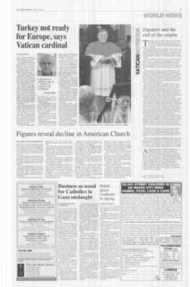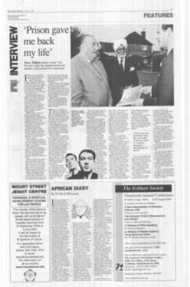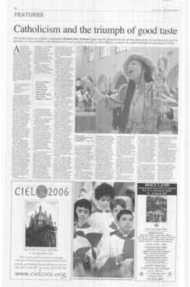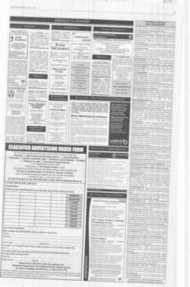Page 15, 14th July 2006
Page 15

Report an error
Noticed an error on this page?If you've noticed an error in this article please click here to report it.
Tags
Share
Related articles
Tolerance In Ireland
Not Built In A Day
What's In A Name?
A Very English Book
Parish In Focus: Our Lady Of Peace & Blessed Dominic...
Troubled identity
Irish and Catholic? edited by Louise Fuller, John Littleton and Eamon Maher, The Columbia Press £10.99
Ishould begin by saying that I am duly honoured that this essay collection makes several references to a book I wrote on this subject in 1997 which is now taught in some universities. But I am still disappointed by this uneven ensemble, which too often goes over repetitious ground instead of offering new insights. And there is one gaping vacuum: no writer addresses the obvious question for Irish Catholics today — how to reconcile a booming capitalist economy with a value system based essentially on centuries of poverty and deprivation.
Aloft in their ivory towers, Left-wing academics just don't get this. Yet, the rise and rise of neocapitalism — which has had the most profound impact on Ireland today — is hugely challenging and deeply relevant to the "understanding of identity".
This book is an attempt to analyse the social and political changes that have occurred in Ireland over past decades: but besides the gaps, it is often too jargonishly academic in its overall approach. What it required was a little more sharp observation and reportage, and a little less deconstruction.
Fr John Littleton, for example, is a priest in the
Diocese of Tallaght, a vast area of west Dublin which has been plagued with drug problems and has one of the lowest rates of churchgoing in the country. It is a pity that Fr Littleton writes an academic essay instead of just telling us what it is like to be a priest in a godforsaken place like Tallaght. You would think that Patsy McGarry, the Unitarian religious affairs correspondent of the Irish Times, would apply some basic journalistic skills in his contribution, "The Rise and Fall of Roman Catholicism in Ireland". He could have been directed to go around the country noting the everyday devotions of the people. Is Corpus Christi still observed by processions, as it once was? Why is there such a fascinating rise in the study of local saints? Why are pilgrimages and old rural customs such as stations still so popular? I was told by an Irish Anglican that house blessings are so widely practised in the countryside now that in Cork, even the Methodists are at it. But no: none of this is probed. Instead, we get a historical tour d'horizon and a re-run of how Irish priests used to preach constantly about sex.
McGarry's figures on the closures of seminaries are useful and specific, however. Eugene O'Brien, a Limerick academic, is much concerned with deconstructing Irish Catholicism according to the mode of Lacan and Derrida, with passing refer
ence to the satirical programme Father Ted. There could have been an entire chapter on Father Ted — its crude cruelty and yet sneaking homage to devotional Catholicism, significant on many levels. But there is only an incidental allusion in an arcane essay impenetrable to anyone but Lacanite deconstructivists. The most engaging essays are possibly those on "Representations of Catholicism in Modern Novels" by Eamon Maher and a study by Paula Murphy of "Catholicism in the works of Dermot Bolger". Engaging because they are about something specific.
And Fr Patrick Claffey's "Reflection on a Changing Irish and Catholic Identity" has a narrative freshness of direct experience, describing his exile in France, from 1976, and later in Togo and West Africa, returning to Ireland in 2002. He feels that Ireland lacks "lay intellectuals who are willing to argue their faith from a perspective of philosophical conviction". I am not sure this is so: what is evident is that such lay intellectuals find it difficult to obtain a hearing.
This book is just not good enough: and it is largely the fault of the three editors, who should have directed their contributions to "answer the question", as we were always instructed in connection with examination papers.
Mary Kenny
blog comments powered by Disqus



















